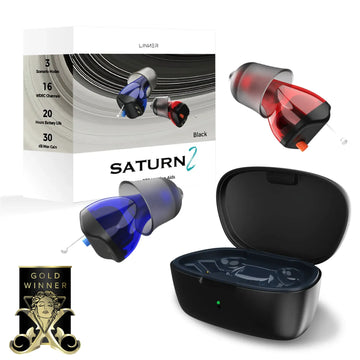What is tinnitus?
Tinnitus is a sensation of sound in one or both ears without any external sound source. More than 99% of the cases are subjective, as the noise is only perceived by the affected individual and is associated with hearing etiology. Objective tinnitus is a rare condition mainly due to vascular or musculoskeletal alterations when the sound is audible to the patient and other people, accounting for less than 1% of the total cases. Tinnitus can be present during hearing loss and dizziness. According to the American Tinnitus Association estimates, ten million Americans are affected by this disorder.
What are the common causes of tinnitus?
Numerous factors are considered to be linked to tinnitus onset, including noise trauma, metabolic disorders, ear diseases, head trauma, infectious agents, and ototoxic medications. Noise-induced hearing loss is a common cause of tinnitus. Military personnel, employees of noisy industries, and musicians frequently exposed to excessive noise have higher risks of this condition. Hypertension, diabetes, and other metabolic diseases increase the susceptibility of tinnitus. However, the etiological factor is not identified in approximately 40% of cases.
How does tinnitus affect daily life?
People experiencing tinnitus complain of ringing, whistling, or buzzing in the ears. The noise can vary in severity and be continuous or occasional. It adversely affects the individual's daily life and overall quality of life. Tinnitus can be a source of anxiety, which may interrupt the sleep cycle, resulting in insomnia. Speech discrimination can also be impaired, leading to poor communication, which will be more prominent in the presence of background noise. People may also present with concentration difficulties due to distress caused by tinnitus. In severe cases, it might cause depression and suicidal thoughts.
What diagnostics tests to do during tinnitus?
Tinnitus is a subjective sensation that cannot be objectively evaluated, measured, or quantified. Physicians generally diagnose it based on the patient's history. However, they would recommend several tests to detect the causative agent. Hearing tests or audiograms will help identify hearing loss, which sometimes accompanies tinnitus. Imaging tests such as CT or MRI scans are not routinely done unless there is a risk of any specific condition that can be an underlying cause of tinnitus. Sometimes, physicians will require additional laboratory tests.
What are the treatment options for tinnitus?
Tinnitus management aims to decrease its intensity through pharmacotherapy and electrical suppression or address the anxiety caused by tinnitus through cognitive and behavioral therapy, pharmacotherapy, sound therapy, and hearing aids. Cognitive therapy assists patients in developing coping mechanisms. Sound therapy applies background sounds to mask tinnitus. Hearing aids are beneficial for patients with hearing loss. They amplify external sounds and mask the ringing in the ears. Electrical suppression intends to suppress tinnitus by electrical stimulation of the cochlea. Some patients will benefit from anti-anxiety drugs, antidepressants, and medications to improve sleep quality. The effectiveness of treatment is individual, and sometimes, these approaches can be combined.
References
https://www.ncbi.nlm.nih.gov/books/NBK430809/
https://www.ncbi.nlm.nih.gov/pmc/articles/PMC2686891/
https://www.ata.org/about-tinnitus/why-are-my-ears-ringing/
https://www.asha.org/public/hearing/tinnitus/
https://www.mayoclinic.org/diseases-conditions/tinnitus/diagnosis-treatment/drc-20350162


![Linner Mercury Clarity OTC Hearing Aids [FSA & HSA Eligible] Linner](http://www.linnerlife.com/cdn/shop/files/Linner-Mercury-Clarity-OTC-Hearing-Aids-_FSA-_-HSA-Eligible_-Linner-110038953.webp?v=1725853434&width=360)

![Linner Mars OTC Hearing Aids [FSA & HSA Eligible] Linner](http://www.linnerlife.com/cdn/shop/files/Linner-Mars-OTC-Hearing-Aids-_FSA-_-HSA-Eligible_-Linner-110039213.webp?v=1725865495&width=360)
